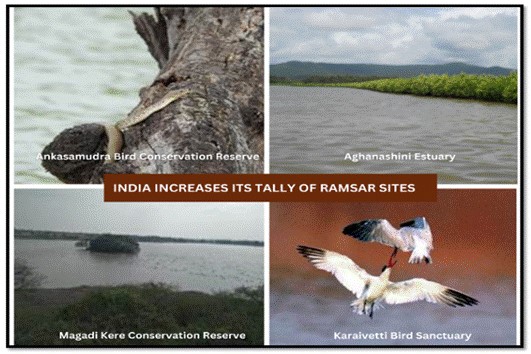From The Editor’s Desk
Nature provides you free lunch, but only if you control your appetite. And that’s what the World Environment Day 2024 focuses on land restoration, desertification, and drought resilience, under the slogan “Our Land. Our Future. We are Generation Restoration.” The Kingdom of Saudi Arabia will host the 2024 global celebrations, focusing on delivering solutions to these pressing issues.
Land restoration can reverse land degradation, drought, and desertification, with each dollar invested in restoration yielding up to $30 in ecosystem services. Restoration boosts livelihoods, reduces poverty, builds resilience to extreme weather, increases carbon storage, and slows climate change. Restoring just 15% of degraded land could prevent up to 60% of expected species extinctions.
Addressing the root causes of land degradation, such as climate change, is essential. Last year’s record-breaking temperatures resulted in widespread heatwaves, storms, floods, and droughts. Effective land restoration must go hand-in-hand with tackling climate change; otherwise, efforts are undermined.
India’s Contribution towards Environmental Sustainability
Mission LiFE
India is leading the way in sustainability and environmental conservation with Mission LiFE (Lifestyle for Environment). This India-led global mass movement aims to inspire individual and community action to protect and preserve the environment. Introduced at COP26 in Glasgow, Mission LiFE focuses on promoting eco-friendly practices and sustainable lifestyles.
India is the first country to include LiFE in its Nationally Determined Contributions (NDCs), reflecting its commitment to combating climate change through behavioural change rooted in traditional, sustainable living.
Mission LiFE channels the efforts of individuals and communities into a global movement for positive change. It emphasizes the importance of conserving natural resources and living in harmony with nature, as advocated in ancient Indian scriptures.
Each phase of Mission LiFE encourages a fundamental shift towards sustainability, aiming to inspire global action towards environmental conservation and climate resilience.
Encouraging Plantation of Trees on Barren Land
Government of India encourages plantation in the country through various programs/schemes such as National Mission for Green India (GIM), National Afforestation Programme (NAP), Nagar Van Yojana, School Nursery Yojana, Compensatory Afforestation Fund Management and Planning Authority (CAMPA) funds, etc. which promotes tree plantation on waste, vacant and barren lands by involving local communities, NGOs, educational institutions, etc.
Wetlands Conservation

India’s commitment to wetland conservation has seen significant milestones. In January 2024, India expanded its Ramsar Site count to 80 by designating new sites in Karnataka and Tamil Nadu. This achievement follows the addition of 11 wetlands in August 2022, commemorating India’s 75th Independence anniversary. The Wetlands of India Portal serves as a knowledge hub for wetland managers and stakeholders, providing valuable information and resources.
Forest and Wildlife Conservation
India has made notable progress in forest conservation and sustainable forest management. At the 19th session of the United Nations Forum on Forests (UNFF), India highlighted its consistent increase in forest cover over the past fifteen years, ranking third globally in net forest area gain.
Further, as per the India State of Forest Report (ISFR) 2021, the Forest Cover of the country is 7,13,789 sq. km, which is 21.71 % of the total geographical area of the country.
India has expanded its network of protected areas, including wildlife sanctuaries, national parks, and tiger reserves. Celebrations of 50 years of Project Tiger and 30 years of Project Elephant underscore India’s dedication to species conservation.
The introduction of the ‘Green Credit Program’ incentivizes tree plantation and restoration of degraded forest lands, further strengthening climate action initiatives.

Mangrove Restoration
Mangrove forests have more capacity to store carbon, provide breeding grounds for marine biodiversity and support global fish populations. Government of India has taken a number of steps to protect and enhance mangrove forests in coastal States/Union Territories through promotional as well as regulatory measures. The promotional measures are being implemented through a Central Sector Scheme ‘Conservation and Management of Mangroves and Coral Reefs’ under the National Coastal Mission Programme. Further, Mangrove Initiative for Shoreline Habitats and Tangible Incomes (MISHTI) was announced in the Union Budget 2023-24 to promote and conserve mangroves.
Ban on Single Use Plastics
Government of India notified the Plastic Waste Management Amendment Rules, 2021, on 12th August 2021, prohibiting manufacture, import, stocking, distribution, sale and use of the identified Single Use Plastic (SUP) items, which have low utility and high littering potential with effect from the 1st July, 2022. The notification also prohibits manufacture, import, stocking, distribution, sale and use of plastic carry bags having thickness less than one hundred and twenty microns with effect from the 31st December, 2022.
Renewable Energy
 Launched on January 4, 2023, with an outlay of ₹19,744 crore, National Green Hydrogen Mission aims to contribute to India’s goal to become Aatma Nirbhar (self-reliant) through clean energy and serve as an inspiration for the global Clean Energy Transition. The Mission will lead to significant decarbonization of the economy, reduced dependence on fossil fuel imports, and enable India to assume technology and market leadership in Green Hydrogen.
Launched on January 4, 2023, with an outlay of ₹19,744 crore, National Green Hydrogen Mission aims to contribute to India’s goal to become Aatma Nirbhar (self-reliant) through clean energy and serve as an inspiration for the global Clean Energy Transition. The Mission will lead to significant decarbonization of the economy, reduced dependence on fossil fuel imports, and enable India to assume technology and market leadership in Green Hydrogen.
India, already, stands 4th globally in Renewable Energy Installed Capacity, 4th in Wind Power capacity and 5th in Solar Power capacity.
Global Initiatives
India is a member of the Global Alliance for Circular Economy and Resource Efficiency (GACERE) and the Steering Committee of the International Resource Panel (IRP). These platforms advocate for a global and just circular economy transition and sustainable natural resource management.
India has also taken steps to protect and enhance mangrove forests through the ‘Conservation and Management of Mangroves and Coral Reefs’ scheme under the National Coastal Mission Programme.
Additionally. the sixth Assembly of the International Solar Alliance (ISA) was hosted at Bharat Mandapam, in New Delhi on October 31, 2023. Ministers from 20 countries and delegates from across 116 Member and Signatory countries participated in the Assembly.
India’s comprehensive approach to environmental conservation, from Mission LiFE to global initiatives, demonstrates its leadership and commitment to building a sustainable future.













